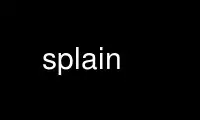
This is the command splain that can be run in the OnWorks free hosting provider using one of our multiple free online workstations such as Ubuntu Online, Fedora Online, Windows online emulator or MAC OS online emulator
PROGRAM:
NAME
diagnostics, splain - produce verbose warning diagnostics
SYNOPSIS
Using the "diagnostics" pragma:
use diagnostics;
use diagnostics -verbose;
enable diagnostics;
disable diagnostics;
Using the "splain" standalone filter program:
perl program 2>diag.out
splain [-v] [-p] diag.out
Using diagnostics to get stack traces from a misbehaving script:
perl -Mdiagnostics=-traceonly my_script.pl
DESCRIPTION
The "diagnostics" Pragma
This module extends the terse diagnostics normally emitted by both the perl compiler and
the perl interpreter (from running perl with a -w switch or "use warnings"), augmenting
them with the more explicative and endearing descriptions found in perldiag. Like the
other pragmata, it affects the compilation phase of your program rather than merely the
execution phase.
To use in your program as a pragma, merely invoke
use diagnostics;
at the start (or near the start) of your program. (Note that this does enable perl's -w
flag.) Your whole compilation will then be subject(ed :-) to the enhanced diagnostics.
These still go out STDERR.
Due to the interaction between runtime and compiletime issues, and because it's probably
not a very good idea anyway, you may not use "no diagnostics" to turn them off at
compiletime. However, you may control their behaviour at runtime using the disable() and
enable() methods to turn them off and on respectively.
The -verbose flag first prints out the perldiag introduction before any other diagnostics.
The $diagnostics::PRETTY variable can generate nicer escape sequences for pagers.
Warnings dispatched from perl itself (or more accurately, those that match descriptions
found in perldiag) are only displayed once (no duplicate descriptions). User code
generated warnings a la warn() are unaffected, allowing duplicate user messages to be
displayed.
This module also adds a stack trace to the error message when perl dies. This is useful
for pinpointing what caused the death. The -traceonly (or just -t) flag turns off the
explanations of warning messages leaving just the stack traces. So if your script is
dieing, run it again with
perl -Mdiagnostics=-traceonly my_bad_script
to see the call stack at the time of death. By supplying the -warntrace (or just -w)
flag, any warnings emitted will also come with a stack trace.
The splain Program
While apparently a whole nuther program, splain is actually nothing more than a link to
the (executable) diagnostics.pm module, as well as a link to the diagnostics.pod
documentation. The -v flag is like the "use diagnostics -verbose" directive. The -p flag
is like the $diagnostics::PRETTY variable. Since you're post-processing with splain,
there's no sense in being able to enable() or disable() processing.
Output from splain is directed to STDOUT, unlike the pragma.
EXAMPLES
The following file is certain to trigger a few errors at both runtime and compiletime:
use diagnostics;
print NOWHERE "nothing\n";
print STDERR "\n\tThis message should be unadorned.\n";
warn "\tThis is a user warning";
print "\nDIAGNOSTIC TESTER: Please enter a <CR> here: ";
my $a, $b = scalar <STDIN>;
print "\n";
print $x/$y;
If you prefer to run your program first and look at its problem afterwards, do this:
perl -w test.pl 2>test.out
./splain < test.out
Note that this is not in general possible in shells of more dubious heritage, as the
theoretical
(perl -w test.pl >/dev/tty) >& test.out
./splain < test.out
Because you just moved the existing stdout to somewhere else.
If you don't want to modify your source code, but still have on-the-fly warnings, do this:
exec 3>&1; perl -w test.pl 2>&1 1>&3 3>&- | splain 1>&2 3>&-
Nifty, eh?
If you want to control warnings on the fly, do something like this. Make sure you do the
"use" first, or you won't be able to get at the enable() or disable() methods.
use diagnostics; # checks entire compilation phase
print "\ntime for 1st bogus diags: SQUAWKINGS\n";
print BOGUS1 'nada';
print "done with 1st bogus\n";
disable diagnostics; # only turns off runtime warnings
print "\ntime for 2nd bogus: (squelched)\n";
print BOGUS2 'nada';
print "done with 2nd bogus\n";
enable diagnostics; # turns back on runtime warnings
print "\ntime for 3rd bogus: SQUAWKINGS\n";
print BOGUS3 'nada';
print "done with 3rd bogus\n";
disable diagnostics;
print "\ntime for 4th bogus: (squelched)\n";
print BOGUS4 'nada';
print "done with 4th bogus\n";
INTERNALS
Diagnostic messages derive from the perldiag.pod file when available at runtime.
Otherwise, they may be embedded in the file itself when the splain package is built. See
the Makefile for details.
If an extant $SIG{__WARN__} handler is discovered, it will continue to be honored, but
only after the diagnostics::splainthis() function (the module's $SIG{__WARN__}
interceptor) has had its way with your warnings.
There is a $diagnostics::DEBUG variable you may set if you're desperately curious what
sorts of things are being intercepted.
BEGIN { $diagnostics::DEBUG = 1 }
Use splain online using onworks.net services
